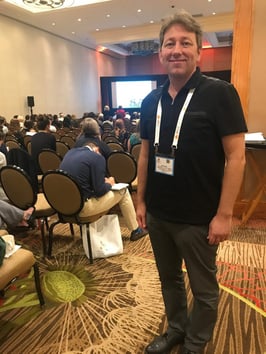In the summer of 2019, Dr. Neil Box toured Colorado with the Sun Bus, attending events with over 700,000 participants and reaching 26,000 people in 46 service days. Free skin cancer screens identified 96 suspected skin cancers, including six cases of dangerous melanoma. The tour also gave Dr. Box the opportunity to hear what people think about skin cancer and sun protection.
“A major bugbear for me was that people feel their sunscreen is going to harm them or damage them in some way,” says Dr. Box, who is a University of Colorado Cancer Center investigator and president of the Colorado Melanoma Foundation. “We encountered a good cross section of public attitudes about skin cancer and I had people say to me, ‘Sunscreen? I never wear it – it will give me cancer!’”
Neil Box, PhD
In short, many people see the risk of cancer from chemicals in sunscreen as greater than the protection sunscreen offers against skin cancer. However, according to Dr. Box, this opinion is simply not based in fact, similar to the anti-science perspective of vaccine avoidance.
“The chemicals in sunscreens have been in widespread use for more than 40 years and studied in detail, yet little evidence of any harm has emerged. On the other hand, wearing sunscreen has a huge effect on blocking the UV that causes skin cancer,” says Dr. Box. “Clearly, the FDA is right in concluding that the benefits far outweigh the risks.”
One recommendation Box suggests is for healthcare providers to avoid the term “chemical sunscreen” when referring to UV absorbing agents such as octinoxate, octosalate, avobenzene and other UV filters that are used very effectively in some sunscreens.
“When you use the word ‘chemical,’ it brings to mind things like DDT and Rachel Carson’s Silent Spring. People will say they don’t want chemicals on their skin, even though we use chemicals in all sorts of beneficial ways, every day,” Box says.
Dr. Box also points out that an option for people especially concerned about skin-penetrating sunscreens may be UV-reflective sunscreens that depend on zinc oxide or titanium dioxide, as these tend to sit on the surface of the skin.
“The biggest worry is skin cancer, not whether your sunscreen is going to hurt you,” says Dr. Box. “There are far too many people who believe there are benefits to alternative remedies that have no basis in fact, and also see risks in proven treatments. We need our public to better understand how evidence-based medicine drives the important decisions in their health care.”


.png)

